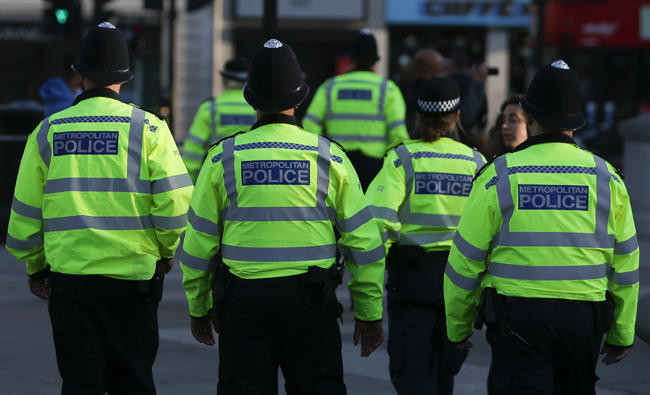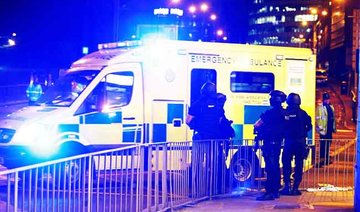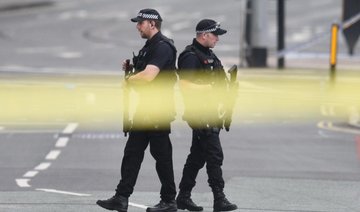MANCHESTER, England: Britain is imminently facing another terror attack, Prime Minister Theresa May warned Tuesday as she deployed soldiers at key sites after a suicide bomber killed 22 people at a pop concert in Manchester.
May said the national terror threat level was being raised from severe to critical, which means another attack is expected “imminently.”
Her dramatic statement came after 22-year-old Salman Abedi, reportedly a Briton of Libyan descent, was identified as the perpetrator behind Monday’s deadly attack, whose victims included an eight-year-old girl.
“It is a possibility we cannot ignore that there is a wider group of individuals linked to this attack,” May said at her Downing Street office.
She announced that the army would be deployed on the streets to support armed police under a plan codenamed Operation Temperer, which was developed in the aftermath of the November 2015 Paris terror attacks.
“This means that armed police officers responsible for duties such as guarding key sites will be replaced by members of the armed forces, which will allow the police to significantly increase the number of armed officers on patrol in key locations.”
“You might also see military personnel deployed at certain events such as concerts and sports matches, helping the police to keep the public safe,” she said.
Started in 2006, the terror threat level is set by a unit based in the MI5 domestic security service.
“Critical” is the highest of five levels and has only been briefly reached twice before and “means an attack is expected imminently.”
Police named Abedi as the suspected suicide bomber, as the Daesh jihadist group claimed responsibility for the carnage.
British media said he was born in Manchester, northwest England, and that his Libyan parents had fled the regime of dictator Muammar Qaddafi.
Monday’s attack came just over two weeks before Britain votes in a general election and is the latest in a series of deadly incidents across Europe.
Earlier attacks, including vehicle-borne assaults in Berlin and Stockholm, have coincided with an offensive on Daesh redoubts in Syria and Iraq by US, British and other Western forces.
Threatening more attacks, Daesh said in a statement published on its social media channels: “One of the caliphate’s soldiers placed bombs among the crowds.”
The suicide bombing came at the conclusion of US pop star Ariana Grande’s concert at the 21,000-capacity Manchester Arena, one of Europe’s largest indoor venues.
Witnesses described the horror when the bomber blew himself up.
“When we left, down the stairs there was probably early teenagers lying on the floor covered in blood and blood on the walls where they’d been laid, so it was just horrifying,” female concert-goer Alex Grayson told AFP.
Police staged an armed raid on a Manchester address believed to be where Abedi lived, carrying out a controlled explosion to gain entry after arresting a 23-year-old man earlier Tuesday in connection with the attack.
In an earlier statement following an emergency ministerial meeting, May said: “A single terrorist detonated his improvised explosive device near one of the exits of the venue, deliberately choosing the time and place to cause maximum carnage and to kill and injure indiscriminately.”
She said during a visit to victims in Manchester that police would look at the security of such venues.
Police promised extra measures at showpiece events coming up such as Saturday’s FA Cup football final.
Campaigning for the June 8 election was suspended by the main parties after the attack and May insisted the country stood tall as defiant chants of “Manchester! Manchester!” broke out at a vigil held in the city center.
'Broken'
Terrified fans, many of them teenage girls, fled the arena in panic after the explosion in the foyer as they began to leave at the end of Monday’s performance by Grande, a 23-year-old former child television star who described herself as “broken” by the attack.
US President Donald Trump and European leaders issued vows of defiance.
Eight-year-old Saffie Rose Roussos and teenager Georgina Callander were among the first of the 22 victims to be confirmed.
Another 59 people were taken to hospital, many with life-threatening conditions.
Witnesses reported seeing bodies on the floor after the blast around 10:30 p.m. (2130 GMT) on Monday, and some fans were trampled as panicked crowds tried to flee the venue.
Families were separated, with dozens of young people taken to nearby hotels overnight, and some parents were still desperately searching for their children on Tuesday.
“I’m just hearing nothing — her phone’s dead,” Charlotte Campbell, whose 15-year-old daughter Olivia was at the concert, told BBC radio.
The attack was the deadliest in Britain since July 7, 2005 when four suicide bombers inspired by Al-Qaeda attacked London’s transport system during rush hour, killing 52 people and wounding 700 more.
It revived memories of the November 2015 attack at the Bataclan concert hall in Paris in which armed men wearing explosive belts stormed in and killed 90 people.
That attack was also claimed by IS, as was one in March by a knifeman at the gates of the British parliament — although police downplayed that claim.
'Act of barbarity'
Queen Elizabeth II condemned the Manchester attack as an “act of barbarity” and observed a minute’s silence at a Buckingham Palace garden reception.
Trump said during a visit to Bethlehem: “So many young, beautiful, innocent people living and enjoying their lives murdered by evil losers.”
In a city famed globally for its musical traditions and football teams, showbusiness stars and teams expressed their horror at the carnage.
“We are deeply shocked by last night’s terrible events,” said Manchester United.
A support center for people caught up in the attack was set up at the Etihad Stadium, the home of their rivals Manchester City.
Britain’s third biggest city was hit in 1996 by a massive car bomb planted at a shopping center by Irish Republican Army paramilitaries which wounded more than 200 people.






















